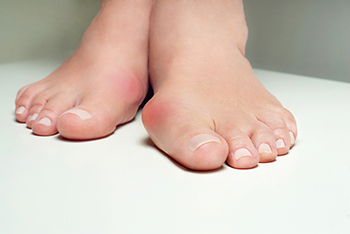Freehold (732) 294-9393
Freehold (732) 294-9393

Bunions are more of a nuisance than they are painful. They can be uncomfortable while wearing shoes, and larger shoes may need to be purchased, which can accommodate the bunion. They are defined as a small bony protrusion that forms on the side of the big toe. It grows gradually, and many patients will eventually seek medical attention to restore normalcy. Swelling and redness can often accompany a bunion, and it may cause the other toes to shift toward each other. A bunion can be caused by genetic reasons, abnormal foot structures, or from frequently wearing shoes that are too tight. Some patients wear a pad on the side of the bunion, which may help to protect it while wearing shoes. If the bunion is severe and causes difficulty in completing daily tasks, surgery may be considered as an option for permanent removal. Bunions are treated by a podiatrist. If you are afflicted with one, please contact this type of doctor who can guide you toward the treatment that is correct for you.
If you are suffering from bunion pain, contact Dr. Henry Miller of New Jersey. Our doctor can provide the care you need to keep you pain-free and on your feet.
What Is a Bunion?
Bunions are painful bony bumps that usually develop on the inside of the foot at the joint of the big toe. As the deformity increases over time, it may become painful to walk and wear shoes. Women are more likely to exacerbate existing bunions since they often wear tight, narrow shoes that shift their toes together. Bunion pain can be relieved by wearing wider shoes with enough room for the toes.
Causes
Symptoms
In order to diagnose your bunion, your podiatrist may ask about your medical history, symptoms, and general health. Your doctor might also order an x-ray to take a closer look at your feet. Nonsurgical treatment options include orthotics, padding, icing, changes in footwear, and medication. If nonsurgical treatments don’t alleviate your bunion pain, surgery may be necessary.
If you have any questions, please feel free to contact our office located in Freehold, NJ . We offer the newest diagnostic and treatment technologies for all your foot care needs.